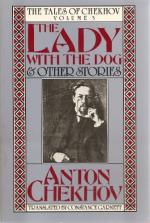|
This section contains 5,632 words (approx. 19 pages at 300 words per page) |

|
SOURCE: “The Epic Vision: Nature and the World,” in Chekhov: A Structuralist Study, Macmillan Press Ltd., 1980, pp. 114–31.
In the following excerpt, Tulloch interprets “The Duel” in light of evolutionary degeneration theory, and views the conflict between an “ambivalence of false choice” and the story's “epic vision of hope and suffering.”
The inauthentic hero is related to science in a number of stories, but perhaps most powerfully in “Dreary Story” and “The Duel.” I shall concentrate my attention here on “The Duel,”1 prefacing my remarks with the point demonstrated earlier: that for Chekhov medical science was not separable from human science (though science was separable, in its methods, from the materialist philosophies of ideologues and reformers).
In “Dreary Story” Chekhov showed the dangers inherent in separating the scientific method from its proper concern with the whole man; in “The Duel” he demonstrated that the evolutionary vision itself was subject...
|
This section contains 5,632 words (approx. 19 pages at 300 words per page) |

|


